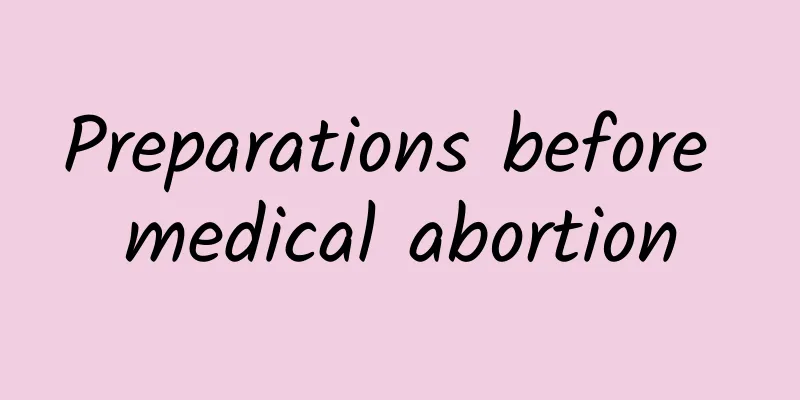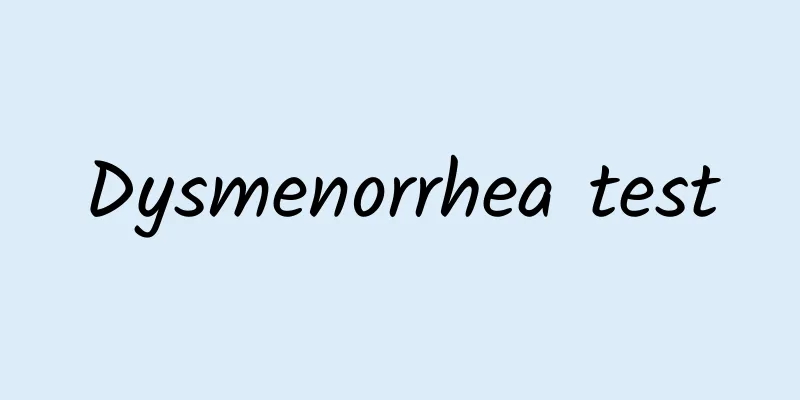Why can't you eat red beans for uterine fibroids? Why can't you eat red beans, black beans, and mung beans for uterine fibroids?

|
Why can't you eat red beans if you have uterine fibroids: Understand the effects of red beans on uterine fibroids Uterine fibroids are common benign tumors in women, which have a certain impact on life and health. In the daily diet, some foods are considered to have certain adverse reactions to uterine fibroids. However, as a traditional ingredient, does red bean have a negative impact on uterine fibroids? This is a question worth thinking about. The relationship between red beans and uterine fibroids Red beans are a common food ingredient that is rich in nutrients and delicious, and is loved by the general public. However, for women with uterine fibroids, eating red beans may have certain risks. Red beans are cold foods that can promote blood circulation. However, for uterine fibroids, accelerated blood circulation may cause the fibroids to grow larger and aggravate symptoms. The reasons why red beans affect uterine fibroids Red beans are rich in phytoestrogens, which can promote the proliferation of endometrial cells, leading to the development and growth of fibroids. In addition, red beans are also rich in fiber. Excessive fiber intake may increase the pressure of patients' fibroids and cause a series of uncomfortable symptoms, such as irregular menstruation and pelvic pain. Alternatives to red beans Although red beans are not suitable for women with uterine fibroids, there are still many other ingredients that can replace red beans to meet the nutritional needs of the human body. Black beans and mung beans are two common substitutes, which are also rich in nutrients. Black beans are rich in protein and B vitamins, which help improve immunity and blood circulation, while mung beans have the effect of clearing away heat and detoxifying, and eliminating moisture. Eating black beans and mung beans can achieve the purpose of nutritional supplementation without causing adverse reactions to uterine fibroids. Other considerations In addition to avoiding the consumption of red beans, women with uterine fibroids should also pay attention to the following points: 1. Control your diet and avoid spicy foods, such as peppers, ginger, etc.; 2. Increase the intake of vegetables and fruits and maintain a balanced diet; 3. Pay attention to rest and avoid overwork; 4. Actively seek treatment and follow the doctor’s advice and medication. in conclusion Uterine fibroids are a common gynecological disease, and diet plays an important role in the treatment and recovery of the disease. Although red beans have certain nutritional value, they may have a negative impact on patients with uterine fibroids. Therefore, women with uterine fibroids should be careful to avoid eating red beans in their diet and choose other substitutes to meet their nutritional needs. In addition, other lifestyle habits should also be paid attention to in order to maintain good physical condition and promote recovery. |
>>: Uterine fibroids cause pleural effusion. Why can uterine fibroids cause pleural effusion?
Recommend
Cervical cyst hypertrophy and hardness
The enlargement and hardening of cervical Nabothi...
What are the dangers of pelvic inflammatory disease in women
The biggest harm of pelvic inflammatory disease i...
How to take care of yourself after abortion
Whether it is a normal abortion or a painless abo...
What are the symptoms of uterine fibroids and what are the treatments for uterine fibroids
1. How do uterine fibroids occur? Traditional Chi...
Multiple artificial abortions seriously harm women's health
At present, many women have artificial abortions,...
Which hospital is good for treating endometrial thickening?
A detailed introduction to which hospital is best...
What can't you eat if you have adenomyosis?
Patients with adenomyosis should avoid high-fat f...
Recommended hospitals for the treatment of threatened abortion
It is very important to choose the right hospital...
What medicine can eliminate pelvic effusion the fastest?
There is no saying that what medicine can elimina...
Why does my stomach hurt like menstruation after abortion? 2 ways to relieve lower abdominal pain
If the pain in the lower abdomen after abortion i...
Is there any harm in treating dysmenorrhea with moxibustion? Now we will reveal the answer to you
Moxibustion can treat menstruation caused by cold...
What is the diagnosis of endometrial thickness?
What is the diagnostic basis for endometrial thic...
How is surgery performed for ectopic pregnancy?
Ectopic pregnancy surgery mainly includes laparos...
Reduce inflammation in your body by doing 20 minutes of moderate exercise every day
In addition to helping people have a better body ...
What should patients with vulvar leukoplakia pay attention to during treatment?
What precautions should patients with vulvar leuk...









